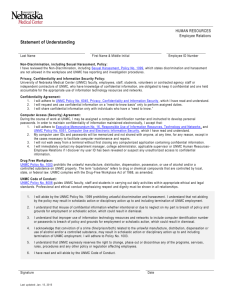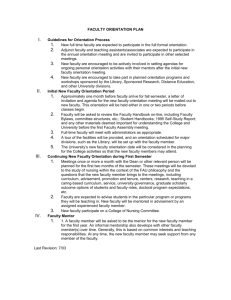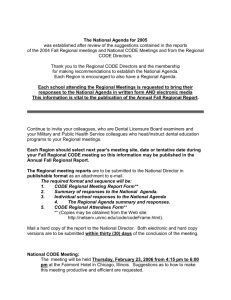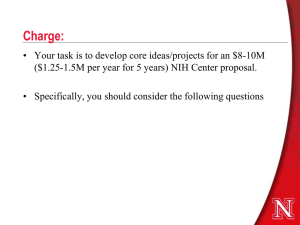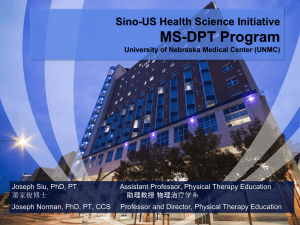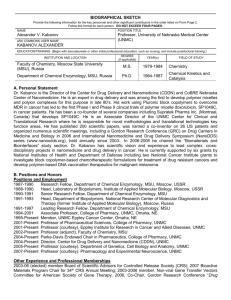Undergraduate Syllabus Template
advertisement
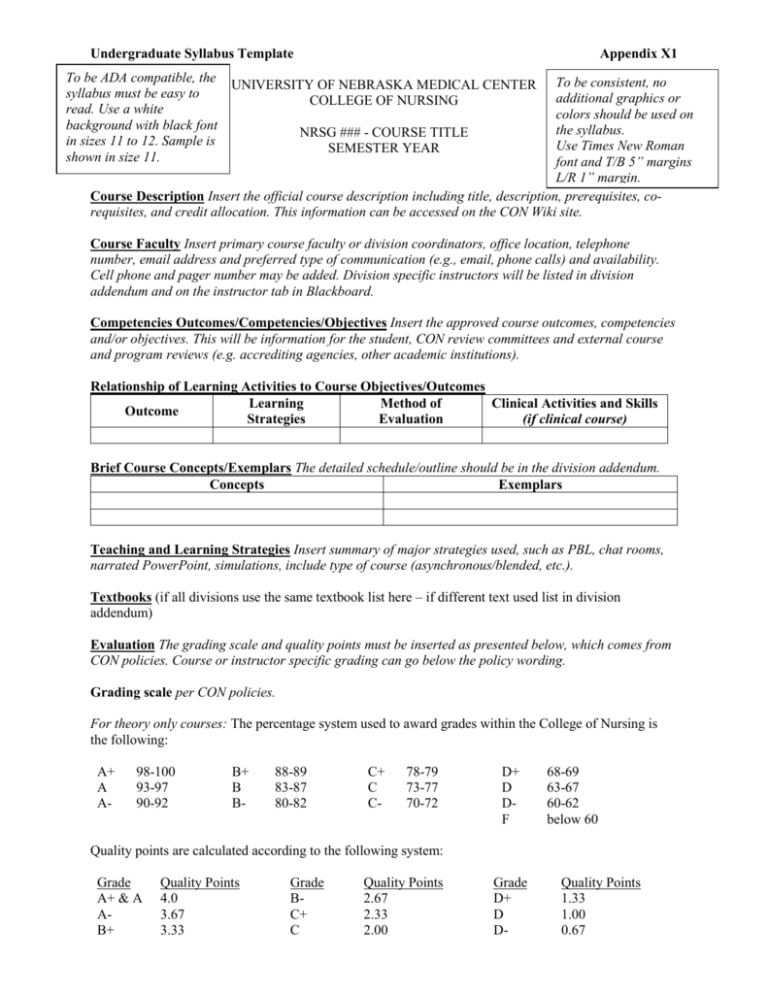
Undergraduate Syllabus Template Appendix X1 To be ADA compatible, the UNIVERSITY OF NEBRASKA MEDICAL CENTER syllabus must be easy to COLLEGE OF NURSING read. Use a white background with black font NRSG ### - COURSE TITLE in sizes 11 to 12. Sample is SEMESTER YEAR shown in size 11. To be consistent, no additional graphics or colors should be used on the syllabus. Use Times New Roman font and T/B 5” margins L/R 1” margin. Course Description Insert the official course description including title, description, prerequisites, corequisites, and credit allocation. This information can be accessed on the CON Wiki site. Course Faculty Insert primary course faculty or division coordinators, office location, telephone number, email address and preferred type of communication (e.g., email, phone calls) and availability. Cell phone and pager number may be added. Division specific instructors will be listed in division addendum and on the instructor tab in Blackboard. Competencies Outcomes/Competencies/Objectives Insert the approved course outcomes, competencies and/or objectives. This will be information for the student, CON review committees and external course and program reviews (e.g. accrediting agencies, other academic institutions). Relationship of Learning Activities to Course Objectives/Outcomes Learning Method of Clinical Activities and Skills Outcome Strategies Evaluation (if clinical course) Brief Course Concepts/Exemplars The detailed schedule/outline should be in the division addendum. Concepts Exemplars Teaching and Learning Strategies Insert summary of major strategies used, such as PBL, chat rooms, narrated PowerPoint, simulations, include type of course (asynchronous/blended, etc.). Textbooks (if all divisions use the same textbook list here – if different text used list in division addendum) Evaluation The grading scale and quality points must be inserted as presented below, which comes from CON policies. Course or instructor specific grading can go below the policy wording. Grading scale per CON policies. For theory only courses: The percentage system used to award grades within the College of Nursing is the following: A+ A A- 98-100 93-97 90-92 B+ B B- 88-89 83-87 80-82 C+ C C- 78-79 73-77 70-72 D+ D DF 68-69 63-67 60-62 below 60 Quality points are calculated according to the following system: Grade A+ & A AB+ Quality Points 4.0 3.67 3.33 Grade BC+ C Quality Points 2.67 2.33 2.00 Grade D+ D D- Quality Points 1.33 1.00 0.67 NRSG ### Semester Year B 3.00 Page 2 C- 1.67 F 0.00 Grades are referenced in Policy 5.2.16 at http://wiki.unmc.edu/CON_Undergraduate_Grading_System. Grades of C or above are considered to be passing grades in the College of Nursing. Students must maintain a cumulative University of Nebraska average of 2.00 GPA in order to remain in good standing. For all courses this is to be included: Incomplete (I) Grade average is not affected until the incomplete has been removed. If the work is not completed during the specified time period, the grade will become an F or such other grade specified by the instructor. The grade of incomplete is awarded according to guidelines set forth in Policy 5.1.9 at http://wiki.unmc.edu/CON_Undergraduate_Grade_of_Incomplete_Policy. Withdraw (W) Students who drop a course after the first seven calendar days of the term will receive a grade of W on their transcript. Students may not drop a course after 70% of the course has been completed. A grade other than W must be assigned. Refer to the UNMC Drop Add policy at http://webmedia.unmc.edu/studentservices/docs/Drop-Add-Policy.pdf. For all PCC courses only: The Patient-Centered Care classroom and clinical courses are considered corequisite. A student who does not receive a passing grade in either the classroom or clinical component of any of the Patient-Centered Care courses must repeat both courses the next time they are offered, even if the student received a passing grade in one of the courses. Clinical Evaluation Math Quiz: To ensure safe administration of medications, a math calculation quiz will be given prior to the students entering the clinical settings. Questions will relate to math content taught in previous nursing courses. The level of passing is 95% or higher. If the quiz is not passed, a retake quiz will be given. The student cannot pass medications in the clinical setting until the math quiz is passed at 95% or higher. Clinical Evaluation: Critical clinical behaviors are identified on the clinical evaluation tool (at the end of this syllabus). Evaluation of clinical performance includes both self-evaluation by the student and faculty evaluation of the student. The clinical outcomes and related behaviors serve as the basis for evaluating student achievement. Each student may request an evaluation of his/her behavior and progress whenever he/she feels the need of additional guidance. Clinical evaluation will be based upon the student's ability to satisfactorily meet all the outcomes identified in the clinical evaluation tool. Weekly records of clinical performance are kept by the faculty and serve as a data collection tool for recording the student's behavior and clinical activities. Records are shared with the students and are intended to: 1) provide data which can be used to help the student identify learning needs; 2) help faculty plan for learning experiences which will enhance the student's learning, and 3) aid in determining whether the student is attaining the course outcomes. The student will be responsible for reading and signing his/her record. The clinical evaluation tool assists the faculty and the student in determining the student's consistent demonstration of behaviors which are indicative of achievement of the outcomes. The use of this tool will be explained at the beginning of the clinical experience. End of clinical rotation conferences between the student and faculty member are required. These conferences provide opportunity for the faculty member and the student to discuss a written summarized evaluation statement of his/her performance in the clinical laboratory. The student will evaluate his/her own performance and provide written feedback on the evaluation forms. NRSG ### Semester Year Page 3 Students who are having difficulty meeting clinical outcomes will be notified. The clinical instructor will assign the student’s grade by evaluating the student’s performance according to the critical clinical behaviors for each course. A student who faculty deems is unprepared or unsafe will be required to leave the clinical setting and enter into a remediation plan until they are deemed prepared to return to the clinical setting. The student may be removed for a short duration or the rest of the semester. A student not able to return and to complete the critical clinical behaviors before the end of the semester will receive a fail for the clinical course. For clinical courses only: Clinical laboratory performance is rated on a Pass/Fail basis. A rating of Pass in clinical performance results in a P in the clinical course. A rating of Fail in clinical laboratory performance results in an F in the clinical course. For courses in which theory and clinical are combined, this is be included: Clinical laboratory performance is rated on a Pass/Fail basis. A rating of Fail in clinical laboratory performance results in a D in the course unless the theory grade is an F. If the clinical laboratory performance is Pass, the grade awarded for the course will be based on the theory grade. For courses with ATI: ATI Implementation Statement Passing the NCLEX-RN is required to practice as a licensed RN. The UNMC College of Nursing recognizes preparation for passing this important test must begin from the moment you enter the program. To enhance your learning and test-taking skills, the UNMC College of Nursing has adopted an NCLEX preparation program, ATI (Assessment Technologies Institute). This cumulative product will be used through all four semesters of our program. It involves assessing aptitude and learning abilities, practicing for computerized tests, knowledge building, and assessing comprehensive knowledge. Evidence indicates utilization of this program enhances learning and test-taking skills and prepares you to successfully pass the NCLEX-RN. Practice Tests Students must attain a score of 95% on the practice test to qualify to take the proctored assessment test. The practice test can be taken multiple times. For students not achieving a 95% on the practice test, there will be a 24-hour lock-out period during which students are expected to review in preparation for the next attempt. Once 95% has been achieved on the practice test, students are eligible to take the proctored test. Students are encouraged to start practicing early to avoid missing the deadline. Practice tests are accessible all semester and may be taken anywhere and time the student has Internet access. The semester ATI product ID will be supplied early in the semester. Faculty encourage students to access these tests several times, utilizing the test-taking hints and rationales, as well as the Focused Review feature, which pinpoints individual weaknesses and directs students to specific pages for review. Students have access to all material at the ATI web site: www.atitesting.com. ATI Materials for this course include list all ATI tests students will take in this course. Include coursespecific instructions as needed. Division-specific instructions should be added to course addendum. Proctored Assessments Students meeting the requirements of the practice tests are qualified to sit for the proctored assessments. Proctored assessments are scheduled, monitored assessments with time limits. The following percentages will be used to allocate points in the final course grade according to the students’ levels of achievement on the priority ATI exams. Students may retake the exam and the higher of the two scores will be used to determine level of achievement. ATI Level Level 3 Percentage of allotted points 100% NRSG ### Semester Year Page 4 Level 2 Level 1 95% 78% < Level 1 0% Students achieving Level 2 or 3 have the option to retake the exam once. Students who achieve a Level 2 and desire to retake the exam are encouraged to remediate prior to the retake, but no minimum hours are required. Students achieving Level 1 or lower are required to remediate and to retake the exam. Students who achieve a Level 1 on the proctored test on the first attempt are required to print out the Individual Focused Review to guide their remediation activities and are required to spend a minimum of 3 hours in remediation. Students who achieve less than a Level 1 on the first attempt must complete 5 hours of remediation using the Individual Focused Review as a guide. Explanation of Proficiency Levels on ATI Proctored Assessments Scores meeting Proficiency Level 3 standard may be considered to exceed most expectations for performance in the content areas. Scores at this level were judged by a panel of content experts to indicate a student as likely to exceed NCLEX-RN standards in this content area. Scores meeting Proficiency Level 2 standard may be considered to exceed minimum expectations for performance in the content areas. Scores at this level were judged by a panel of content experts to indicate a student as fairly certain to meet NCLEX-RN standards in this content area. Scores meeting Proficiency Level 1 standard may be considered to meet the absolute minimum expectations for performance in the content areas. Scores at this level were judged by a panel of content experts to indicate a student as likely to just meet NCLEX-RN standards in this content area. Scores below the Proficiency Level 1 standard are considered to be below minimum expectations and may be indicative of significant risk in the content areas. Scores at this level were judged by a panel of content experts to indicate a student at significant risk and unlikely to meet NCLEX-RN standards in this content area. Student Responsibilities Cheating/Plagiarism Consistent with the College of Nursing policy, a student who engages in any form of cheating, plagiarism or deception regarding clinical activities and/or classroom assignments, will be subject to disciplinary action based on the severity of the act. Refer to the statement entitled “Academic Integrity and Professional Conduct” in the UNMC Student Handbook http://www.unmc.edu/studentservices/_documents/handbook.pdf. For the definition of plagiarism, please refer to the McGoogan Library of Medicine webpage at http://unmc.libguides.com/plagiarism. Student Confidentiality The College of Nursing (UNMC) adheres to the UNMC policy “Security and Confidentiality of Patient Information”. Patient information and academic or personal student information, in any form, is considered to be sensitive and private. Students will request and use patient information only on a need-to-know basis, share confidential health information only with a patient’s healthcare team, and will not discuss patient or personal student information in public places or outside of work. The student will respect clients’ rights, and the rights of other students, in relations to privacy, confidentiality, informed consent, treatment and refusal of treatment as privileged communication and discloser to safeguard themselves and others. It is understood that issue of confidential information, whether intentional or due to neglect on the student part, is a breach of policy and grounds for corrective action, which could result in dismissal from the nursing program. Students are also expected to follow the policies and regulations of the clinical agency. Student Obligation to Provide Care All students are obligated to provide care to assigned clients regardless of race, creed or religion. Any students with health, religious or ethical concerns that may limit NRSG ### Semester Year Page 5 their participation in a health care activity must inform the instructor no later than orientation to the course, or as soon as the information becomes available. The instructor shall make the final decision about assignment of care, taking into consideration the student’s expressed concerns. Student Right to Evaluate Course and Faculty Students have the right and responsibility to evaluate courses and faculty. All evaluations are anonymous. Classroom and Clinical Expectations Attendance Class attendance at scheduled times is expected. Absences are to be reserved for illness or other serious events, and the instructor is to be notified prior to class. Make necessary arrangements with the course instructor to make up missed work. Being on time Students are expected to be on time regardless of location and time zone, and remain in attendance for the entire class/clinical unless otherwise directed. Disruptions of any kind during class are to be avoided. Use of personal phones and computers Students must follow instructor guidelines and etiquette for using cell phones and computers during class. In the clinical setting where cell phones are permitted, cell phones must be on silent and used for clinical application only. Technology guidelines It is expected that students will meet recommended technology requirements for full class participation. Follow instructor’s guidelines and etiquette specified for the technologies used in your class. See your Blackboard course site or the technology support page for more detailed information at http://www.unmc.edu/nursing/admissions/online-education1/technology-support.html. Proctor Statement for Remote Students If proctor is needed for this course, please contact your course instructor. Refer to Policy 5.1.11 and Appendix V for more information at http://wiki.unmc.edu/CON_Proctors_for_Remote_Students. Student Use of Clinically Related Lab Supplies and Equipment The UNMC College of Nursing (CON) purchases consumable supplies for use by students in the learning environment, both in skills labs and simulation, under close supervision of faculty and/or teaching assistants. Task trainers (e.g. pelvis models for urinary catheterization) and equipment such as injection pads and simulation manikins provide a safe mechanism for practicing invasive skills. Safe performance of invasive skills, when completed following established guidelines, can be attained in this environment without risk of harm to patients. Refer to Policy 6.2.5 for complete policy and definitions at http://wiki.unmc.edu/CON_Student_Use_of_Clinically_Related_Lab_Supplies_and_Equipment. Academic Success Resources The Academic Success Program in the UNMC Counseling & Student Development Center offers assistance with study skills, test taking, and stress management. More information is available on the student counseling website at http://www.unmc.edu/stucouns/. In addition, the College of Nursing offers academic success resources on each division. Please contact the Student Services department at your division for more information. Accommodation of Students with Disabilities (ADA) It is the policy of the University to provide reasonable, flexible individualized accommodation to students with documented disabilities; faculty are not required to provide accommodations without prior approval from the Disability Services Office. To receive accommodation, students must apply to the Disability Services Office. Information and an online “Request for Services” form are available on the website of the Counseling and Student Development Center which houses the DSO (www.unmc.edu/stucouns click Services and Programs). Please contact the Coordinator of Services if you wish to arrange a meeting or have additional questions. NRSG ### Semester Year Page 6 Social Media The University of Nebraska Medical Center College of Nursing approves using social media platformssuch as blogs, wikis, podcasts, Facebook, LinkedIn, Twitter, YouTube, Pinterest, Flickr, or other social networks, social collaboration tools, text messages, etc. not in existence at the time this policy was implemented - as a communications platform to connect with students, colleagues, alumni and friends. The University of Nebraska Medical Center College of Nursing support the social media policy outlined at http://wiki.unmc.edu/Social_Media. Title IX Information Reporting allegations of rape, domestic violence, dating violence, sexual assault, sexual harassment, and stalking enables the University to promptly provide support to the affected student(s), and to take appropriate action to prevent a recurrence of such sexual misconduct and protect the campus community. Confidentiality will be respected to the greatest degree possible. Any student who believes she or he may be the victim of sexual misconduct is encouraged to report to one or more of the following resources: If you would like more information about Title IX, please click here http://www.titleix.info/. Retaliation against the student making the report, whether by students or University employees, will not be tolerated. UNMC Title IX Coordinator: Carmen Sirizzotti 402.559.2710 Local Agency and Campus Security numbers Kearney Lincoln Agency: S.A.F.E. Center Agency: Voices of Hope Crisis 308.237.2599 Line: 402.475.7273 Campus Security 308.627.4811 Non-Emergency: 402.476.2110 Campus Security Dial 2 for Blue: 402.472.2222 Omaha Agency: Women’s Center for Advancement 24/7 Crisis Hotline: 402.345.7273 Español Hotline: 402.672.7118 Campus Security 402.559.5111 Norfolk Agency: Bright Horizons Hotline/Crisis: 402.379.3798 Campus Security 402.841.5163 Scottsbluff Agency: The Doves Program 308.436.HELP (4357) 877.215.0167 (Español) Police Department 308.632.7176 or 911 Inclement Weather/Emergency Closure Procedures In the event of a severe weather or other emergency in which the police request that UNMC keep people off the streets in Omaha, the Chancellor will officially close the campus and cancel classes including College of Nursing classes. In the event that UNMC does not close or cancel classes, but UNO/UNL/UNK (as the case may be) cancels classes, the CON will suspend classes (i.e. if UNO cancels classes, Omaha CON suspends operations; if UNL cancels classes, Lincoln CON suspends operations; if UNK cancels classes, CON Kearney suspends operations; if NECC cancels classes, Norfolk CON suspends operations). The Assistant Dean, West Nebraska Division (WND), will determine whether classes will be suspended for the WND. There may be times when a decision must be made by individual faculty about classes or clinical experiences when there is no official cancellation. In this event, College of Nursing faculty members must make a judgment regarding the wisdom of having class or clinical experience at this time. In making decisions about class and clinical, faculty should consider that maintaining safety of all is a priority. See the policy for specific procedures per division at http://wiki.unmc.edu/CON_Cancellation_of_Classes_or_Clinical_Experiences. Add Next Page Section Break to previous page, then include this saved date information in last page footer: NRSG ### Semester Year Page 7 CON/2/6/2016/initials/initials Undergraduate Division Specific Syllabus Addendum COURSE ADDENDUM UNIVERSITY OF NEBRASKA MEDICAL CENTER COLLEGE OF NURSING DIVISION NRSG ### - Course Title Semester, Year Specific grading information goes here. If these are division-specific, this information MUST appear in the division-specific addendum. Include information such as the following as applicable: Assignments/work with guidelines for completion Grading rubrics and percentage weights for each Make-up exam policy Minimal requirements to pass Other criteria or policies related to performance Clinical/Laboratory Criteria for clinical requirements Grading specifics
